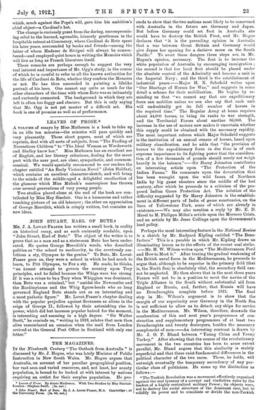JOHN STUART, EARL OF BUTE4
Mu. J. A. LOVAT-FRASEE has written a small book, in reality an historical essay, and as such eminently readable, upon "John Stuart, Earl of Bute." The object of the writer is to prove that as a man and as a statesman Bute has been under- rated. He quotes George Meredith's words, who described politics as " the school to mediocrity, to the covetously am- bitious a sty, Olympus to the genius." To Bute, Mr. Lovat- Fraser goes on, they were a school in which be had much to learn, to Pitt Olympus, to Fox a sty. He made, he thinks, "an honest attempt to govern the country upon Tory principles, and he failed because the Whigs were too strong. H it was a crime to be a Tory when Whiggism was dominant, then Bute was a criminal," but " amidst the Newcasties and the Rockinghams and the Whig figure-heads who so long governed England Bute stands out as an interesting and a most pathetic figure." Mr. Lovat-Fraser's chapter dealing with the popular prejudice against Scotsmen as aliens in the reign of George II., followed by their astonishing rise to power, which did but increase popular hatred for the moment, is interesting and amusing in a high degree. " Sir Walter Scott," he reminds us, "writing in 1818, relates that men then alive remembered an occasion when the mail from London arrived at the General Post Office in Scotland with only one letter."


















































 Previous page
Previous page